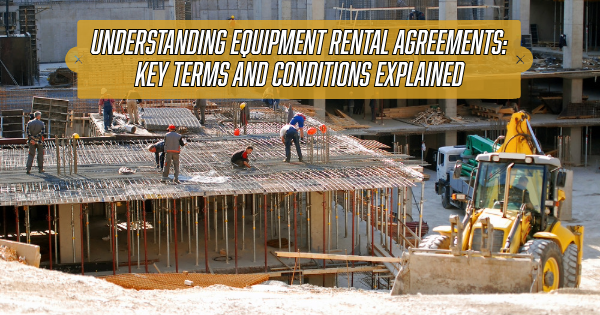In the bustling world of construction and industrial work, heavy equipment rental agreements have become a cornerstone of operational success. Whether you’re a seasoned project manager or an entrepreneur making your first foray into the field, understanding these agreements is crucial. They not only dictate the terms of the equipment usage but also impact the financial and legal standing of your projects. With the right knowledge, you can navigate these contracts with confidence, ensuring you meet your project goals efficiently and effectively.
Lease Periods
One of the fundamental aspects of heavy equipment rental agreements is understanding the terms of the lease period. Typically, these agreements will define the start and end dates of the equipment rental, with specifics on renewal options and any penalties incurred for late returns. Given that the total construction spending in the U.S. was recorded at a staggering $1.98 trillion in August 2023, according to Digital Builder, managing project timelines and equipment availability becomes even more critical to avoid unforeseen expenses and delays.
Liability and Insurance Clauses
Another crucial factor to consider is the liability and insurance clauses present in equipment rental agreements. These clauses detail who’s responsible for the equipment in case of damage, theft, or other mishaps during the rental period. While some agreements may include insurance in the rental costs, others might require separate coverage. Understanding these terms can prevent unexpected liabilities and ensure that you are adequately protected against potential risks.
Cost Implications
Additionally, cost implications go beyond just the rental fees; understanding applicable taxes, maintenance costs, and upfront deposits is indispensable. Some agreements may require the renter to cover the maintenance and repair expenses, which can significantly influence the total cost of the rental. This awareness allows businesses to budget accurately and choose apparatus that aligns with their financial capacity and project requirements.
Thoroughly understanding heavy equipment rental agreements is essential for anyone involved in construction and industrial projects. By familiarizing yourself with key terms such as lease periods, liability, insurance, and cost implications, you can ensure that these agreements serve as tools for success rather than hindrances. With construction spending reaching unparalleled heights, the ability to efficient manage resources, including rented equipment, can significantly impact your project’s outcome. Reach out to Sync Aggregate today to learn more.

